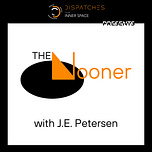This is The Nooner, a short daily (Monday - Saturday) newsletter slash podcast that has its very own section within Dispatches from Inner Space.
Every Sunday, I publish the Dispatches Weekly Digest (DWD), which lets you binge all the Nooners from the previous week. It also includes a meaningful song recommendation, and a short segment I call TMI, where I go off script to bring you backstage, so to speak.
Two more things about the DWD:
It goes on on the main Dispatches channel, so if you’re looking to spare your inbox from the daily emails without missing out on anything, you can specifically unsubscribe from The Nooner section, and still get the Digest on Sunday.
It’s only available to paid subscribers.
The Dispatches Weekly Digest is a labor of love, and I’m really proud of it, and if you want to hear it, I want you to hear it. So, if you can afford it…
And if you can’t, but you still think of yourself as one of my true fans, let me know and we’ll work something out.
We are the anti-Christ
The most radical claim Jesus made was that all people are equally and intrinsically valuable, and therefore deserve unconditional love.
This idea was so new, and so shocking, and so contrary to what pretty much everyone believed beforehand, that it revolutionized religious philosophy forever.
The concept became deeply enough baked into Western thought that most of us believe that it always existed, that it is a universal ideal that people would naturally want to support and defend.
And yet our behavior betrays our true beliefs. We absolutely do not treat people as though they are intrinsically, let alone equally, valuable. And while Christian-influenced Western philosophy did a pretty good job of motivating lip service to this idea for a good long while, it’s no longer considered villainous to claim otherwise.
Especially because there is one metric of evaluation that drives pretty much our entire culture: productivity.
Productivity is the metric by which we judge almost everyone, especially ourselves.
In this way, we have become the anti-Christ.
If that sounds extreme, let’s break it down.
Jesus says, “I love you.”
Why?
“Because you exist.”
OK, but why?
“Because you exist. That’s it. That’s the whole reason.”
It doesn’t make sense to us. Because all the humans we know say, “We love you if you make us feel good. If you give us things. If you make our lives easier.”
This is how we learn, from the time we’re born, to work hard for human love. We try to be “productive members of society.” We do our best to make sure our kids grow up to be the same.
And we feel ashamed if we fail.
If you followed the hype-cycle of AI at all, you saw a bunch of headlines claiming that the new large language models could make us feel good, and give us things, and make our lives easier — all faster and cheaper and better than humans.
And then the headlines said, “Oh no! We can’t compete! We’ll lose our jobs! Etc!” You could practically smell the existential fear in the air. If AI could do all the love-earning things better than humans, how could humans possibly hope to earn love?
Eventually, on the other side of the hype cycle, the headlines said, “Nevermind! False alarm. We’re all good.”
Nice. But for how long?
How long before we give birth to so-called AGIs? Or, in other words, models that actually are better at love-earning things than we are?
The scariest thing about AI is not that it will one day take over all our love-earning work, but that it is already calcifying our deep-seated belief that love is and should be conditional.
We shouldn’t be afraid of AI taking our jobs, we should be afraid that our machines, insofar as they are products of human invention and nature, will always set quantifiable conditions for our value.
In other words, any AI we build will be, in Kantian terms, evil, forever classifying human beings as means to some end, rather than as ends in themselves.
We already do this, of course. But one day, and soon, AI will do it better.










